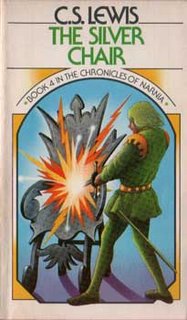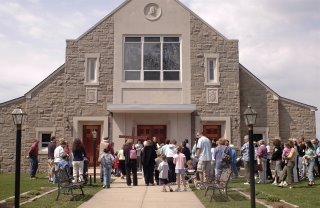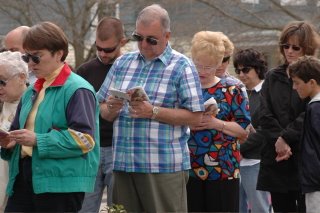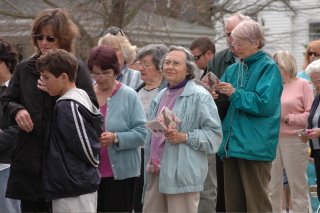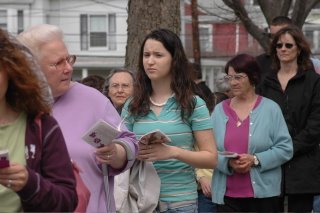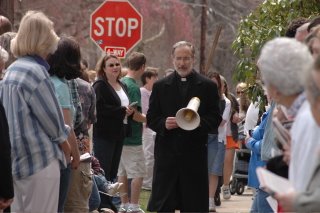 The National Geographic Society's exhibit in Washington, which contains artifacts of the Gnostic Gospel of Judas.
The National Geographic Society's exhibit in Washington, which contains artifacts of the Gnostic Gospel of Judas.(Third Sunday of Easter (B): This homily was given on
[For the audio version of this homily, click here: Third Sunday of Easter 2006]
Which gospels do you want? Which gospels do you want to use as the basis of your religious beliefs?
The ones that were inspired by the Holy Spirit? The ones that were written in the first century by the 4 men whose images adorn the back wall of our sanctuary: Matthew, Mark, Luke and John?
Or the ones that were written much later, by the so-called “Gnostics”? I’m talking here about writings like the Gospel of Judas (which has been in the news quite a bit recently); the Gospel of Thomas (made famous several years ago in the movie, Stigmata); the Gospel of Peter; and the Gospel of Philip. (Now please don’t be fooled: these Gnostic gospels weren’t actually written by the apostles themselves. Rather, Gnostic authors put the names of the apostles on their writings in order to deceive real Christians and lead them away from the true faith.)
At this time, let me say a brief word on Gnosticism itself, since people today are still buying into it! Case in point: Dan Brown, much celebrated author of The DaVinci Code. I hope you realize, all the so-called “deep insights” about Jesus and Christianity that he shares in this book are nothing more than ideas he ripped off from ancient Gnostic writings! They’re not new truths; they’re simply old lies!
The name itself—Gnosticism—comes from a Greek word (gnosis) meaning “knowledge”. Gnostics were people who considered themselves to be “in the know” with respect to the deep mysteries of God and the universe. They thought they were smarter and more spiritually enlightened than everyone else—which is one reason why the philosophy is still very popular today. In our pride, we like to think we know spiritual secrets that “ordinary men and women” don’t know.
In the early centuries of Christianity, the followers of Gnosticism were a lot like people in the contemporary New Age Movement. That is to say, they weren’t members of one single organization. Rather, they were people from many different groups who embraced similar ideas about life, God and salvation.
For example, the Gnostics did not believe that Jesus Christ was truly human (as genuine Christians did). To them, his humanity was merely an illusion. Consequently, in their view, Jesus did not experience death on the cross. He only appeared to die. As one author put it, his crucifixion was really a “cruci-fiction”.
Nor did they believe that Jesus was God, the Second Person of the Blessed Trinity. To them he was an “aeon”—a created being who was on a level somewhere between God and humans.
Gnostics sometimes disagreed among themselves on particular issues, but nearly all of them agreed on this crucial point: physical matter is evil (and that includes the human body), but the human soul or spirit is good.
This explains why, in the Gospel of Judas, Judas is considered a hero for helping to get Jesus killed! As most newspaper articles mentioned a few weeks ago, in the Gospel of Judas Jesus says to his betrayer, “But you will exceed all [the others]. For you will sacrifice the man that clothes me.”
In other words, “Judas, by betraying me and getting me crucified you’ll be doing me a really big favor! You’ll be helping me to get rid of this evil body that I have. You’ll help to set my spirit free from this flesh that holds it in bondage.”
Now, when you stop and think about it, you have to admit, there’s something rather appealing about this particular Gnostic teaching. You see, if your body is truly bad, then it obviously doesn’t matter what you do with it. You can get drunk every day; you can have any kind of sex you want as often as you wish. When it comes to your flesh there are no rules you have to follow!
Sounds rather tempting, does it not? That’s why people like Dan Brown think it’s great!
This, of course, is exactly the opposite of what Matthew, Mark, Luke and John teach in their gospels. They teach that matter is good, not evil. In John 3:16, for example, Jesus doesn’t say, “For God so hated the world”; he says, “For God so loved the world.”
God doesn’t hate the material universe or consider it to be evil. After all, he’s the one who made it!
And he made it a moral universe, governed by laws and commandments.
A staunch Gnostic of the first century would wretch at a statement like that.
Following the teaching of the real gospels is obviously much more difficult than following the teachings of Gnosticism, because it requires discipline, repentance and sacrifice. But, in the long run, it’s really much better. Trust me. Because if “matter” is really as bad as the Gnostics said it was (and as some contemporary New Agers still say it is), then it becomes almost impossible to argue against evils like the Holocaust and the terrorist attacks of 9/11!
You see, according to strict Gnostic principles, the Nazis did those 6 million Jews a big favor during the Second World War by setting them free from their evil bodies! Thus, they weren’t murderers; they were liberators! They did for the Jews (and for many others) what Judas did for Jesus (according to the Gospel of Judas).
The terrorists did the same for those who died in the World Trade Center on September 11, 2001.
Do we really want to say that? Do we really want to rewrite history and call both the Nazis and the terrorists of 9/11 “liberators”?
I hope not. But we would be forced to, if we believed the Gnostic gospels. We would even be forced to say that suicide is morally good, since the person who takes his own life frees himself from his own evil body.
The real Jesus took on human flesh out of love, and he redeemed it through his resurrection. That’s the Good News! Jesus didn’t just come to save our souls from eternal death; he came to save “all” of us—body and soul—from eternal death! At 49 years of age, incidentally, that’s a thought that appeals to me more and more. I like the thought of getting back my thinning hair and my dark beard. I like the thought of having a transformed, glorified body without any middle-age aches and pains in it!
Notice in today’s resurrection story from Luke 24 how determined Jesus is to get his disciples to understand that his resurrected body is real! Even though he doesn’t need to eat (because his body is immortal), he does so anyway. He has a nice fish meal with his apostles, and he tells them to touch his body.
The Gnostics must have freaked out when they first read this story. It must have made them sick!
That’s why they felt so compelled to write their own fictitious accounts of Jesus’ life.
There are many other things I could say about the Gnostics, but I think I’ll leave that for future homilies—especially with the release of the film, The DaVinci Code, looming on the horizon.
So which gospels do you want? Which gospels do you want to use as the basis of your religious beliefs—the 4 we have in the Bible, or the Gnostic ones?
I would tell you my personal answer to that question, but at this point I really don’t think I need to.
I’ll only say that I hope and pray that your answer is the same as mine.

